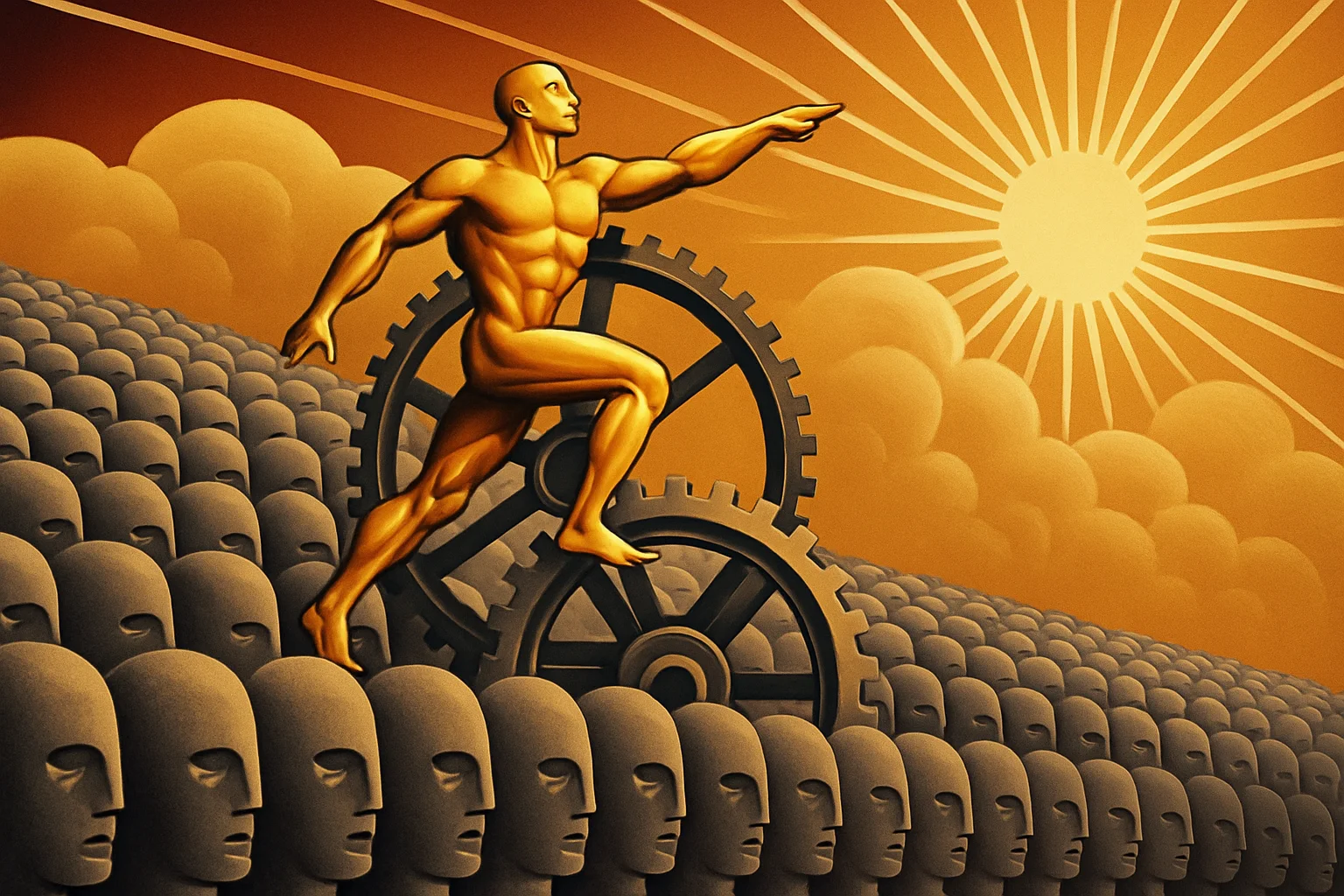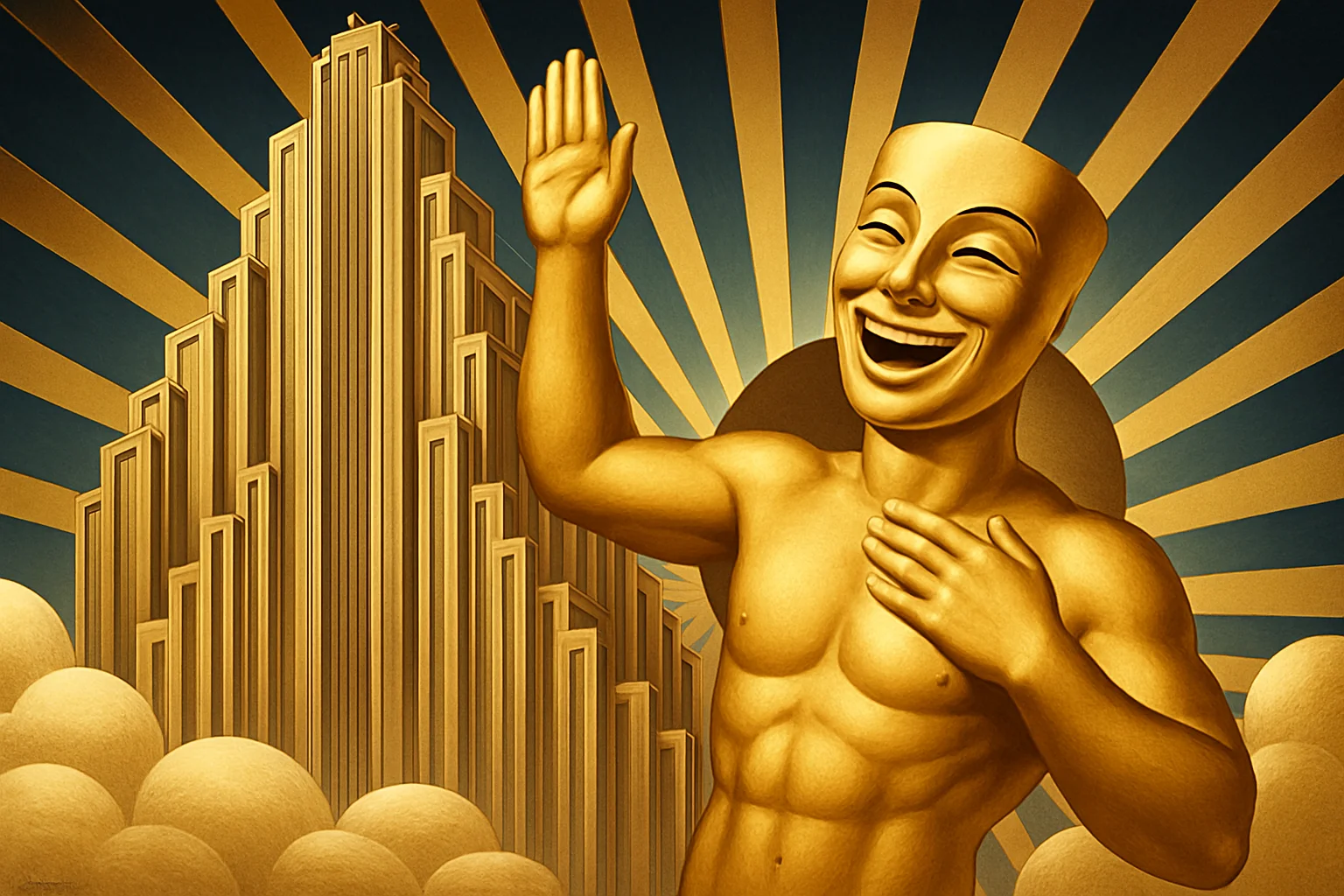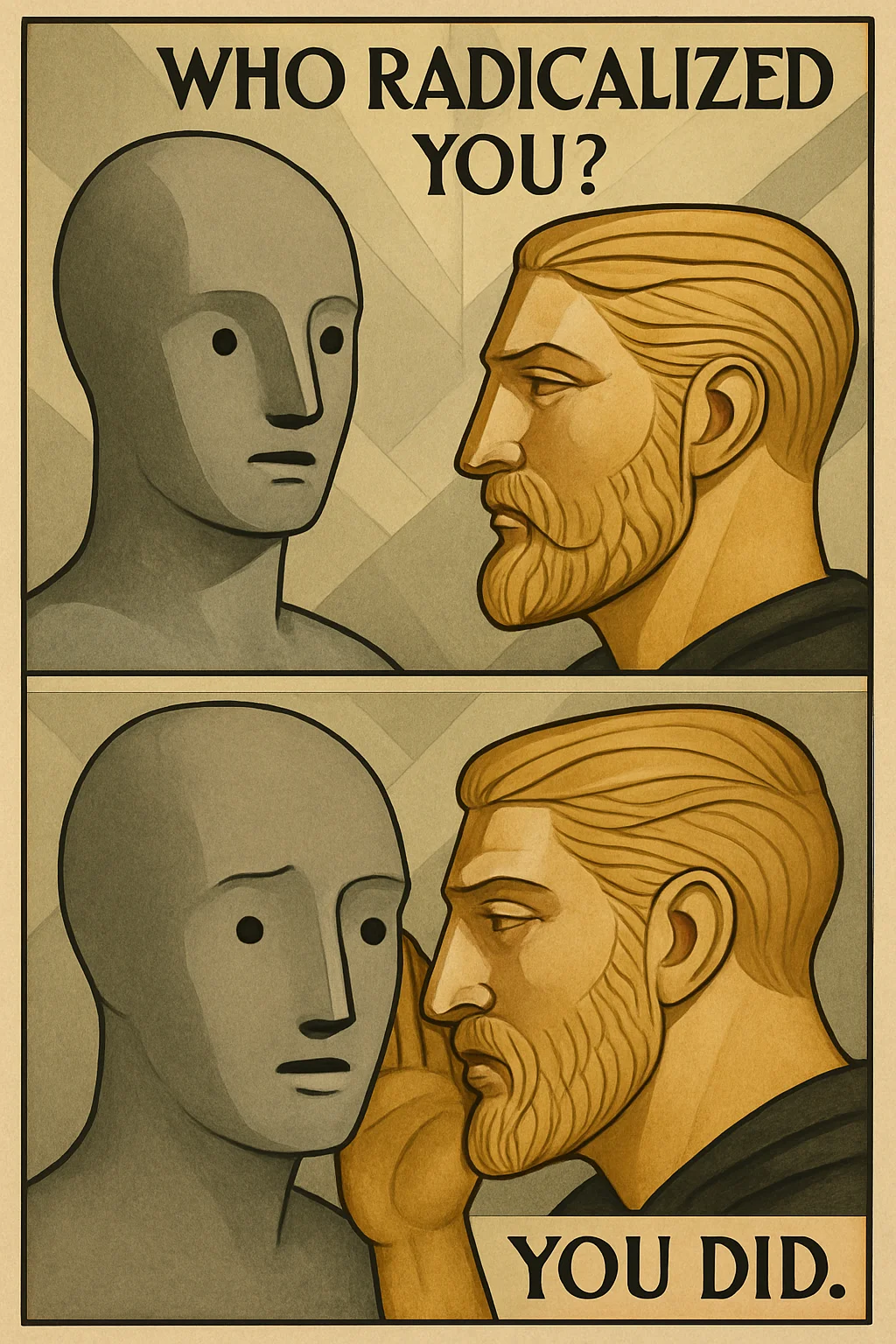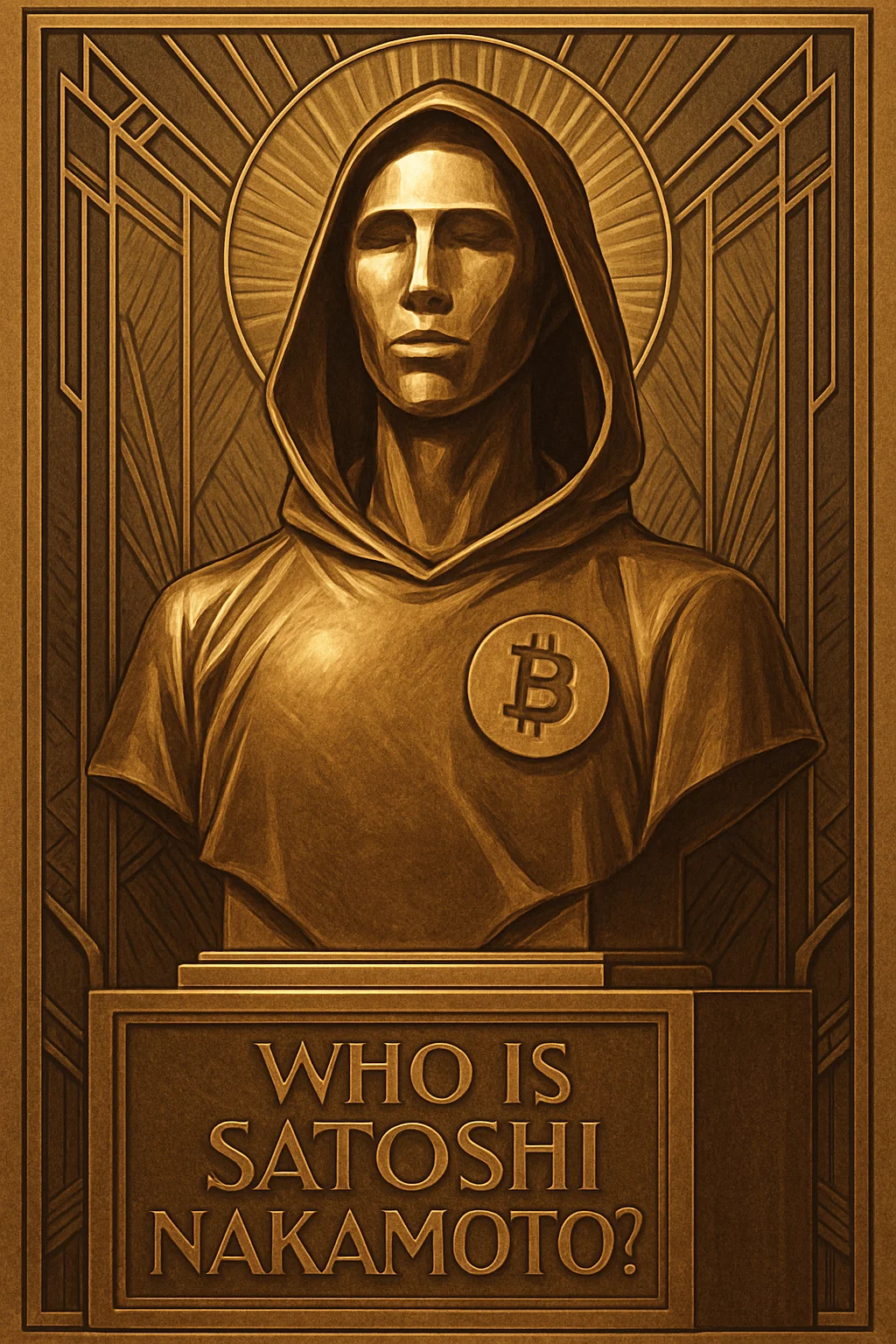The Modern Atlas Shrugged
The Strike

In Ayn Rand’s Atlas Shrugged, “The Strike” is the moment when the world’s producers—those who drive innovation, industry, and progress—withdraw their talents from a society that exploits and stifles them. John Galt, the enigmatic leader, calls these creators to abandon a decaying system, retreating to a hidden refuge known as Galt’s Gulch.
“Mr. Rearden,” said Francisco, his voice solemnly calm, “if you saw Atlas, the giant who holds the
world on his shoulders, if you saw that he stood, blood running down his chest, his knees
buckling, his arms trembling but still trying to hold the world aloft with the last of his
strength, and the greater his effort the heavier the world bore down on his shoulders—what would
you tell him to do?” “I … don’t know. What … could he do? What would you tell him?” “To shrug.”
In Atlas Shrugged, the methods by which people go on strike vary significantly. Some, like Ken Danagger, resign quietly without explanation. Others take drastic measures, such as destroying their factories, mines, inventions, or other productive assets to prevent their use by the government or looters. For instance, Ellis Wyatt, the head of Wyatt Oil, sets fire to his oil fields, leaving a message: “I am leaving it as I found it. Take over. It’s yours.” Midas Mulligan and Hugh Akston resign from their high-profile positions and refuse to participate in government committees or public events. Some individuals stop producing or creating but remain physically present, while others reject lucrative contracts and offers from the government or withdraw their patents and inventions.
The core of the story is “Galt’s Gulch,” a secret valley in Colorado where the strikers retreat to escape the oppressive world outside. It serves as a haven for the productive, allowing them to live freely and pursue their passions without government interference or looters. The valley symbolizes individualism and self-sufficiency, enabling the strikers to thrive without the burdens of collectivism. Hidden from the outside world, it is protected by geographic isolation, camouflage, and an optical illusion. Entry to the valley is by invitation only, and its members are sworn to secrecy, ensuring that its existence and location remain undisclosed to outsiders.
A faction led by Ragnar Danneskjöld, a pirate, aims to liberate the country from looters by attacking government ships and seizing their cargo. He deliberately targets resources that are being forcibly redistributed. His goal is to return wealth to its rightful owners, much like Robin Hood. He believes that by destroying the looters’ wealth, he can compel them to confront their own moral bankruptcy, ultimately leading to their downfall.
Today, Europe, particularly Germany, is experiencing a real-world echo of this fictional exodus. Entrepreneurs, professionals, and capital are fleeing due to burdensome regulations, high taxes, soaring energy prices, and an increasingly hostile environment for innovation. A striking survey by “Die Familienunternehmer” (The Family Entrepreneurs) reveals that 46% of Germans aged 18–25 have considered emigrating, highlighting the depth of disillusionment among the nation’s youth. Who could blame them? They contribute to systems like the retirement Ponzi scheme and a failing healthcare system, yet they will receive less than they pay in over their lifetime. Politicians have further burdened their future with an additional debt of €1.5 trillion, and there is no end in sight for rising taxes. But not only the young think about leaving. A recent YouGov survey published this month reveals that 58% of Germans could see themselves emigrating if they were fully independent in their professional, personal, and financial lives. Among the respondents, 31% indicated they would emigrate “definitely,” while 27% said “probably.” Additionally, 22% stated they would “probably” not emigrate, and 15% responded “definitely not.”1
Germany has around 84 million inhabitants. Over 20 million are pensioners, making up a quarter of the population. Nearly 20 million public sector employees work in areas such as the police, fire service, and education. Fifteen million people receive social benefits, including working single mothers who do not earn enough. Approximately 13 to 14 million children and young people rely on state benefits, such as child benefits. In total, about 69 million people live partially or entirely at the expense of the remaining 15 million who are actively working and contributing to the financing of the system. The burden on these “Atlases” is becoming too heavy.
European citizens are trapped in a state of slavery due to inflation, taxes, and regulations. They constantly battle against politicians, mainstream media, churches, unions, and NGOs that attempt to justify the theft. This struggle is not just about escaping; it is about reclaiming agency and creating new worlds.
Modern Forms of the Strike: How People Are Already Shrugging
Emigration (“Voting with Your Feet”)
The flight of Germany’s entrepreneurial talent is a vivid manifestation of “Atlas Shrugged.” A panel discussion hosted by Mark Friedrich, featuring four prominent German entrepreneurs—Prof. Dr. Richard Werner, Dr. Markus Krall, Dr. Andreas Beck, and Friedrich himself—reveals a stark reality: three of the four have already relocated to Switzerland. Their reasons are telling: lower taxes, reduced regulatory burdens, and a stable environment that respects individual achievement. Switzerland, with its decentralized governance and economic freedom, has become a beacon for those escaping Germany’s stifling bureaucracy.

Or consider the podcast duo Hoss and Hopf as further evidence. Hoss has settled in Dubai, drawn by its business-friendly policies and minimal tax regime. He cites the emirate’s streamlined processes and lack of personal income tax as critical factors, allowing him to focus on growing his ventures rather than navigating red tape. Hopf, meanwhile, moved to Switzerland in 2024, seeking not just economic advantages but also safety and relief from what he perceives as oppressive ideological pressures, such as Germany’s growing emphasis on progressive social policies like LGBT ideology and unsafe streets for his children. These individual stories reflect a broader trend: Germany’s entrepreneurs are voting with their feet, abandoning a nation that once nurtured industrial giants for destinations that reward initiative.
Where are these modern Atlases retreating? Four destinations stand out as real-world equivalents of Galt’s Gulch: Switzerland, Dubai, Singapore, and Uruguay. However, many more exist. An entire industry of educators is producing content on emigration, providing insights into potential countries for relocation and patterns of tax evasion associated with statelessness.
Switzerland: Often dubbed “Europe’s Galt’s Gulch,” Switzerland boasts a GDP per person of €82,914 (PPP) compared to the EU’s €55,835, a government debt of 38.3% of GDP versus the EU’s 80.8%, and an unemployment rate of 2.5% against the EU’s 5.9%. Its innovation index (67.5 vs. the EU’s 59.6) and low youth unemployment (2.6% vs. 15.2%) underscore its appeal.
Dubai: The UAE, particularly Dubai, offers a tax haven with no personal income tax and business-friendly policies encapsulated in “The 8 Principles of Dubai”—a framework emphasizing efficiency, transparency, and economic freedom. Hoss’s relocation reflects Dubai’s rise as a hub for entrepreneurs, with 4,500 millionaires moving there between 2015 and 2019. Its modern infrastructure and minimal regulation make it a stark contrast to Europe’s bureaucratic morass.
Singapore: Renowned as Asia’s economic powerhouse, Singapore combines a GDP per person of around €80.000 (PPP) with a government debt of just 168% of GDP, remarkably low for a global city-state. The country’s unemployment rate hovers at a minimal 2.0%, and its Global Innovation Index score of 59.8 rivals that of top European economies. Singapore’s tax regime is highly competitive, featuring a maximum personal income tax rate of 22% and no capital gains tax, attracting entrepreneurs and professionals alike. Its strategic location, world-class infrastructure, and political stability—ranked among the safest and cleanest cities globally—make it a magnet for global talent. With English as an official language and a vibrant multicultural society, Singapore offers seamless integration for expats seeking opportunity and a quality of life in the heart of Southeast Asia.
Uruguay: Known as the “Switzerland of South America,” Uruguay provides 0% tax on foreign income for 11 years, permanent residency in two years, and a passport granting visa-free access to 153 countries. Its safety (the lowest crime rate in South America), digital infrastructure (5G and universal laptop programs), and emerging startup ecosystem (e.g., dLocal, its first unicorn) attract professionals and investors seeking stability and opportunity.
The exodus is not limited to entrepreneurs; skilled professionals are also leaving in large numbers. Between 2015 and 2019, millionaire migration patterns tracked by Henley & Partners reveal a global shift. Countries like the UAE (+4,500), Singapore (+3,200), Australia (+5,200), and Switzerland (+1,800) experienced significant inflows, while nations such as China (-13,500), India (-6,500), and the UK (-3,200) faced outflows. Europe, including Germany, is losing its high-net-worth individuals—those who often drive innovation and investment—to jurisdictions that offer greater economic freedom. In Germany, the 46% emigration consideration rate among young adults indicates a potential brain drain of future professionals, worsened by economic pressures like rising oil prices and projected administrative costs for 2025. According to a 2024 survey by Statista, 65% of Germans have considered leaving the country.
Figures on the emigration of Germans from Germany have been collected since the 1950s. In that decade, 450,000 Germans emigrated each year. This number steadily increased to over 1 million in the 1990s and has remained constant at around 1.4 million per decade since then. These individuals are typically highly skilled and cannot easily be replaced by low-skilled immigrants from Africa or Muslim countries.
The reasons people emigrate are often similar: they seek financial self-determination and safety. A society can function in two ways: as a strict law-based society, where all laws are clear, leave no room for interpretation, and are applied equally to everyone, like Singapore or Dubai, or as a high-trust society with a homogeneous population, such as Korea or Japan.
You cannot simultaneously have free immigration and a welfare state. […] As long as you have a
welfare state, I do not believe you can have a unilateral open immigration.
Any other concept of a multi-ethnic nation with a welfare state, tried in many European countries, is doomed to fail. Countries like Korea and Japan have recently learned that their societies struggle with a significant number of foreign individuals who do not respect their culture and customs. Japanese people are becoming increasingly upset with tourists who do not behave. In South Korea, Johnny Somali, a controversial American live-streamer, has been charged with causing a “commotion” at a convenience store and is banned from leaving the country. Facing up to five years in prison, Somali is known for provocative stunts that include confrontational remarks, racially insensitive comments, and disruptive behaviors, such as interrupting performances and harassing pedestrians. He has been banned from multiple social media platforms and currently streams on Rumble. On March 12, 2025, Somali pleaded guilty in a Seoul court to multiple charges, drawing widespread condemnation for his offensive and disrespectful antics abroad.
While emigration offers a clear and decisive way to “shrug”—to withdraw one’s productive energies from a system perceived as hostile—this path is not available or desirable for everyone. The reality is that most people, for reasons both personal and practical, remain rooted in their home country. Family ties, financial constraints, cultural attachment, or a desire to improve conditions from within can keep individuals from joining the exodus. Yet, the impulse to reclaim autonomy and resist encroaching controls is not limited to those who leave. For the many who stay, a quieter, but equally significant, form of withdrawal is underway: the creation of parallel structures and self-reliant communities within the existing system.
Internal Exit: Parallel Societies and Self-Reliance
Those who wish to stay must navigate a world filled with corrupt government institutions, compromised gated organizations, a legacy media that acts as the state’s propaganda arm, and politicians who exploit the state for personal gain. Fortunately, a viable method already exists, one that was previously employed in the oppressive Soviet Union.
Ivan Jirous, a Czech poet and the artistic director of a rock band, urged the community of Czech artists in the 1970s, during the height of communist oppression, to establish independent music labels, publishing houses, concert halls, art exhibitions, and other infrastructure. He believed that if enough infrastructure were created, an “independent society” would spontaneously emerge, serving as a pocket of creative freedom in a highly repressive environment.
If it proves impossible legally to compel the ruling power to change the ways it governs us, and
if for various reasons those who reject this power cannot or do not wish to overthrow it by force,
then the creation of an independent or alternative or parallel [society] is the only dignified
solution […]
Vaclav Benda recognized the significance of this idea. He saw in it the seeds of a non-violent solution to the destructiveness of Communism. He aimed to extend this concept beyond music and the arts.
The term “Parallel Society” encompasses independent social, cultural, and economic structures outside state control. This concept advocates for alternative systems in education, science, scholarship, politics, information networks, and free markets—essentially creating a comprehensive parallel economy.
The ultimate phase of this process is the situation in which the official structures […] simply
begin withering away and dying off, to be replaced by new structures that have evolved from
‘below’ and are put together in a fundamentally different way.
By the late 1980s, the parallel society in Eastern Europe had grown strong, decentralized, and disconnected from the state, causing the Communist authorities to lose their grip on power.
What can we learn from this? The parallel society is not just a theoretical concept; it is a practical strategy for resisting totalitarianism. It involves creating independent structures that operate outside the state’s control, allowing individuals to thrive without relying on the oppressive system.
This could mean starting to consume alternative media, listening to alternative podcasts, or joining local meetups. You might begin a local food cooperative, a homeschooling group, or a Bitcoin circle. It could involve using other mediums of exchange instead of government-backed fiat currencies, such as Bitcoin, and the Lightning Network. You could start using decentralized social media like Nostr that promotes freedom of expression, and use encrypted chat messengers like Session, which use onion routing and where you own the private keys. You could create self-sustainable communities, conduct scientific research or scholarship free of institutional pressure, and consume or create educational resources, music, or literature.
Civil Disobedience and Non-Compliance
Henry David Thoreau, a foundational thinker on this subject, observed that those who, by default or routine, “yield to [government] their allegiance and support are undoubtedly its most conscientious supporters, and so frequently the most serious obstacles to reform.”

The German language has a remarkable word that is difficult to translate fully: “Mitläufer.” The literal translation is “someone who runs with [the crowd].” Since the Third Reich, this term has described individuals who do not actively participate in the regime but support it through passive acceptance of its rules and regulations. This group comprises roughly two-thirds of people who conform to the masses, even when they know it is wrong and harmful to others. Two famous experiments from the 1950s and 1960s demonstrated that 65% of people are willing to harm or even kill someone if an authority figure instructs them to do so (Milgram experiment) and will go along with any lie when everyone else in the experiment does the same (Asch conformity experiments. This represents the majority of people in any society. They are the ones who will always follow the state, regardless of how oppressive it becomes. Don’t be one of these people; instead, become the sand in the machine.
The most effective way to undermine the state is to sabotage it whenever possible. Thoreau argued that actively refusing to support unjust government actions is key:
Let your life be a counter-friction to stop the machine. What I have to do is to see, at any rate,
that I do not lend myself to the wrong which I condemn.
He stated that the minority remains powerless as long as it conforms to the majority. However, once it begins to disrupt the system, it transforms into a powerful force. Civil disobedience and non-compliance are not just options; they are a moral duty, as Martin Luther King Jr. noted:
Civil disobedience is the refusal to abide by an order of the government or of the state or even
of the court that your conscience tells you is unjust. Civil disobedience is based on a commitment
to conscience. In other words, one who practices civil disobedience is obedient to what he
considers a higher law.
The methods of sabotage are varied, and no limit is set to creative ideas on how to disrupt the system. Chinese democracy activists, for instance, have used a strategy of accelerating the CCP’s authoritarianism ad absurdum by flooding official lines with minor complaints, overwhelming the state’s capacity to enforce its own rules and thus exposing the absurdity and limits of authoritarian control.
In response to a significant doxing scandal involving Jan Böhmermann, a state-funded late-night show host, who disclosed the private information about an anonymous right-wing YouTube influencer and visited the influencer’s parents late at night, creative ideas to sabotage the system were shared on 𝕏. Individuals proposed various strategies to increase the cost and effort for the fee collection center that is collecting the extorted money for the state-funded broadcasting. Some people send their payments in small amounts, either overpaying or underpaying, and wait for multiple reminder letters before settling the bill. Some don’t pay at all and start legal battles that can take years. Others send their payments to an address in a different state, which requires the funds to be manually reassigned to the correct state, taking 15 minutes of manual work per payment.
Another idea is to overwhelm the telephone hotlines and email inboxes of newly established reporting centers for hate and incitement in some states with false reports.
For while the assassination of a tyrant is simply an isolated individual act within an existing
political system, mass civil disobedience, being a direct act on the part of large masses of
people, is far more revolutionary in launching a transformation of the system itself. […] For
then, the remedy to power is simply to withdraw that consent.

The simplest form of disobedience is frequently saying “No!” However, civil disobedience encompasses various methods, and each individual must determine their willingness to act. Some actions may constitute administrative offenses or even crimes, so it’s crucial to consider the consequences of your disobedience. Simple ideas include opting out of government programs, such as the digital patient record, or disregarding rules that seem unreasonable, like waiting at a red traffic light when no one is around. Germans are among the most obedient people in the world, and crossing a red light will likely result in someone reprimanding you.
My favorite German podcast, Aethervox Ehrenfeld, has the motto “Normie muss weinen” (Normie has to cry) as a philosophy. This means you do and enjoy anything that state-conforming, statist people dislike and find offensive. Eating meat is a sign of toxic masculinity? Have one for breakfast, lunch, and dinner! Drinking raw milk is far-right? Where is the nearest farm to get fresh milk? Celebrating Christmas and wishing “Merry Christmas” is insensitive to Muslims? Well, “Merry Christmas and a fucking New Year!” Driving a petrol car is bad for climate change? Buy a bigger car with more horsepower! The more those people get offended, the more fun you will have.

Ridicule is generally regarded as one of the most effective weapons against totalitarian thinking. Absurdity is intrinsic to tyranny, and “no acid is more corrosive to the absurdity of tyranny than laughter.”2 Psychological studies and political philosophy agree: humor and ridicule can undermine fear, diminish the rulers’ aura of invincibility, and expose their hypocrisy. Totalitarian leaders and demagogues are notoriously humorless; ridicule destabilizes them, puts their pretensions into perspective, and encourages others to question their legitimacy.
We must learn to treat the demagogue and aspirant dictators in our midst (…) with the weapons of
ridicule. The demagogue himself is almost incapable of humor of any sort, and if we treat him with
humor, he will begin to collapse.
With the internet and social media, we live in the best time to follow this advice. While individuals like Joost A. M. Meerloo, an active member of the Dutch resistance during World War II, had to print and distribute pamphlets to mock their oppressors, we can achieve this with just a few clicks. The internet is a powerful tool for spreading ideas and memes that can challenge the authority of tyrants and demagogues. The power of ridicule is amplified by the speed and reach of social media, making it a potent weapon against authoritarianism.

You can learn about memes on Know Your Meme, learn about special words and phrases to mock the enemy on Urban Dictionary, and create your own memes on one of the many platforms, for example, the Imgflip Meme Generator. You can even use AI to generate fake images of politicians doing funny or ridiculous things. The possibilities are endless. If you would like to learn how an expert works with memes and viral clips, take a look at the channel of Snicklink on 𝕏. He is a master of meme creation and the use of AI for ridicule and satire, and his work has made it multiple times into television around the globe, including Fox News.
Teaching, Spreading Ideas, and Building Culture
One of the most important tasks for those within the system is to educate others about the concepts of freedom, self-reliance, and individualism. The Western world, particularly Germany, faces significant deficits in these areas, making this task seem daunting. German-speaking countries were the breeding ground for two immensely destructive ideologies: National Socialism and Marxism. These ideas spread rapidly and led to the bloodiest civil war in human history. Socialists states have murdered between 140 and 200 million people in democides in the 20th century. Germany experienced two socialist dictatorships in one century: the Third Reich and the GDR.

Additionally, Germany exhibits an unusually high level of obedience. This trait began in the Holy Roman Empire, where fragmented small states with local rulers ingrained loyalty to authority in the German psyche. Prussian militarism and bureaucracy in the 18th and 19th centuries emphasized discipline, order, and obedience to authority. Nationalism in the 19th century fostered a sense of national identity tied to the state. The failure and instability of the Weimar Republic led many to crave strong, stable authority, paving the way for the acceptance of authoritarian rule. The Nazi regime exploited and amplified obedience and authority, using propaganda and terror to ensure conformity. After the war, Germany was rebuilt on democratic principles while valuing order, rules, and the state. It transitioned to a mixed economy that is predominantly socialist and becoming increasingly so.
The task of educating people about libertarianism and economics is hard, but it is the last effort to save this country from decaying into a third socialist dictatorship. To achieve success, libertarians need to fight against the Marxist tactic applied for more than 60 years: the long march through the institutions. We need to focus especially on young people who are fed up with being robbed of their hard-earned labor and wealth. Socialists try to constantly blame the results of their socialist policies on the capitalist system.
The greatest challenge is addressing the reinterpretation of words by socialists. For example, when they mention “capitalism,” they actually refer to “crony capitalism” or “state capitalism,” not the free market. This concept aligns more closely with corporatism, the economic aspect of fascism as defined by Giovanni Gentile. In this system, the state and corporations work together, using lobbying and cronyism to obtain special privileges, protections, and subsidies. This sharply contrasts with free market capitalism, where the market functions without state intervention, and competition and innovation drive progress. True capitalism involves voluntary exchanges between individuals and businesses, with prices determined by supply and demand. It rewards hard work, creativity, and entrepreneurship, rather than depending on state intervention and favoritism. Only a society where everyone is free aligns with human nature.
Another example is the definition of “freedom.” Libertarians define freedom as the absence of force from the state, while socialists view it as freedom from external natural circumstances, such as limited resources and the necessity of working for a living. They categorize certain things as “rights” that are, in reality, “privileges.”
This fight needs to be fought not only with reason, but also with emotion because this is how humans work. Formats that use humor, mockery, and ridicule are often more effective than dry academic arguments.
The fight for libertarian values will always be challenging because socialism is rooted in greed, envy, laziness, and the desire for power. Our task is to convince young people that effort, hard work, low time preference, hardship, delayed gratification, and self-reliance are essential for a happy life. Socialism resembles snake oil; it promises an easy life for everyone in exchange for obedience and your soul. In reality, it becomes a prison of the mind and body.
Nothing of value is free. Even the breath of life is purchased at birth only through gasping effort and pain.
Whoever is keen to join the ranks of educators is welcome. We need individuals who are willing and able to teach liberty and self-reliance. Education at all levels is essential. Many Libertarian resources, such as books, audiobooks, and podcasts, are available for free. The Mises Institute offers a vast array of free learning materials. However, we also need to create resources that are easier to digest. This includes developing memes, children’s cartoons like the Tuttle Twins, podcasts, books, and other media. We seek people who are eager to create and share educational materials that teach the principles of liberty, self-reliance, and individualism. We need a desocialization of the youth.
Digital and Financial Sovereignty
One of the most important tasks for each individual is to learn about digital and financial sovereignty. As discussed in the sections above, the state continually diminishes our wealth through taxes and monetary expansion. Since its introduction in 2002, the euro has lost more than 90% of its value when compared to gold. The US dollar has fared even worse, losing 98.8% of its value since 1971.
A century ago, in a stable gold-backed monetary system, you could buy a house with three to three and a half years’ income. Today, it takes 10 to 12 years’ income to purchase a home. Your grandparents and parents were able to buy houses not because they worked harder than you, but because their money retained more value. The state has robbed you of your wealth and your future. It has taken away your time and opportunities.

Four financial options are available for individuals to protect their wealth: gold, Bitcoin, securities (stocks, ETFs, bonds, etc.), and real estate. Depending on your risk tolerance, choose one or more of these options to safeguard your wealth. Each option has its advantages and disadvantages. The older generation of libertarians tends to favor gold, while the younger generation shows more interest in Bitcoin. Both options are valid, so select the one that best fits your needs. If you want to invest in stocks or ETFs, consider that it may not be advisable to do so in Europe. Additionally, the “emerging markets” have also significantly underperformed in the last years. Keep in mind that stocks and ETFs may be highly overvalued due to monetary expansion and the Cantillon effect.
Gold remains a valuable asset due to its limited supply and track record spanning thousands of years. It has proven to be a reliable investment during times of crisis. However, it can be easily confiscated by the state unless stored at home, and storing gold in a facility is often expensive. In Galt’s Gulch, gold serves as a means of exchange and a store of value. New ideas for utilizing gold are emerging, such as Markus Krall’s concept of a gold account linked to a credit card, allowing payments directly from that account. This enables you to keep your income in gold while paying with a credit card, presenting an innovative way to use gold. On the downside, every purchase of gold above €2,000 is reported to the tax office. If you don’t keep your gold outside of Germany, it could be confiscated at any time.
Bitcoin is the new digital form of gold. The younger generation of libertarians typically prefers Bitcoin to gold, with many investing their entire income exclusively in it. While Bitcoin was a much riskier investment ten years ago, it is now safe to say that it is here to stay. The most notable aspect of Bitcoin is its limited supply of 21 million coins, which cannot be inflated. Bitcoin is a decentralized currency that operates independently of any government or central authority.
Bitcoin was created in 2009 by an anonymous individual or group using the pseudonym Satoshi Nakamoto. One of the biggest mysteries surrounding Bitcoin is Satoshi’s disappearance. Satoshi gradually reduced their involvement and stopped communicating publicly by 2011. Many individuals have been suspected or have claimed to be Satoshi, but none have been conclusively proven. It is believed that Satoshi owns about 1 million bitcoins, most of which have never been moved. This mystery enhances Bitcoin’s decentralized ethos and intrigue, as there is no central authority or figure. Satoshi’s anonymity is viewed as a safeguard against influence, legal issues, or centralization.
Individuals around the world mine Bitcoin, and its value is determined by supply and demand in the market. Miners validate transactions and secure the Bitcoin network through proof-of-work, earning new bitcoins and transaction fees for their efforts. The most significant recurring event for Bitcoin is the halving, which reduces the reward miners receive for mining new blocks by 50%. This event occurs approximately every four years (every 210,000 blocks). By 2035, Bitcoin will have experienced its 7th and 8th halvings, with the 8th halving likely to occur in 2036, reducing the reward to ₿0.390625 per block. As of May 2025, about ₿19,690,000 have been mined. After several more halvings by 2035, over 99% of all Bitcoins will have been mined. The last bitcoin is expected to be mined around the year 2140.
Each Bitcoin can be divided into 100 million smaller units called “satoshi.” The smallest unit of Bitcoin is one satoshi, equivalent to ₿0.00000001. This means that even if you own a fraction of Bitcoin, you can still use it for transactions or investments. Most importantly, the state cannot confiscate it. You could cross the border with nothing but your 12- or 24-word secret phrase remembered, which serves as your private key, allowing you to access all your money at your new home.
Digital sovereignty is essential for individuals to protect their wealth and privacy. This includes using encrypted communication tools, secure passwords, and privacy-focused browsers like Brave Browser or Tor. The state is increasingly monitoring online activities, so individuals must take proactive steps to safeguard their digital lives. This can involve using virtual private networks (VPNs), encrypted messaging apps, and secure email services.
Thanks to Starlink, you can now access satellite internet nearly anywhere in the world, even in the most remote locations. This is especially beneficial for those who wish to live off the grid or in areas with limited internet access. Starlink offers high-speed internet without depending on traditional ISPs or government-controlled networks. In a recent article, Dr. Simon Goddek, a scientist and podcaster, demonstrated how he lives off the grid in the middle of the Brazilian jungle using Starlink.
It is always wise to stay informed about government plans that may infringe on your financial and digital sovereignty and to take action against them. Websites like Privacy Tools collect information on how to maintain privacy and anonymity online.
Personal Development and Resilience
Regardless of whether you stay or emigrate, the state dislikes self-reliance the most. It prefers individuals who depend on it for survival. The state favors people who do not think critically and possess minimal skills. Their ideal citizen is born, pays taxes, and dies. This is why they seek to regulate and forbid everything.

Nothing frightens the Leviathan more than self-reliant, resilient, and independent people. Klaus Schwab, the former chairman of the World Economic Forum, identified the enemy of his corporate-fascist agenda, the Libertarians, during a recent panel discussion.
You have this Anti-System Movement. What we are seeing is a revolution against the system. So
fixing the present system is not enough. Now, there is, of course, an anti-system called
libertarianism, which means tearing down everything that creates some kind of influence of
government in private lives. It’s dismantling the system.
In one thing, he is right: we are going to destroy the influence of the state over our lives. We want to be free and self-sufficient. We want to be able to choose how we live our lives without interference from the state.
Fortunately, it is easier than ever to acquire skills of any kind today. Whether you would like to learn a language, gardening, playing instruments, repairs, hunting, cooking, healthy eating, living off-grid, or building your own house, you can find a course online. YouTube is filled with videos that teach you how to do anything. Additionally, you can find books and online courses on almost any topic. For example, you can learn languages for free on Duolingo or explore various subjects at no cost on Khan Academy. All you need is the desire to learn and the time to do it. The internet has made education more affordable and accessible than ever, yet hardly any people take advantage of it.
Learning languages is extremely useful if you are thinking about emigrating. English is surely one of the best investments you can make because considerable parts of the world speak at least some English. Spanish is the second most spoken language in the world, with over 500 million speakers. It is the official language of 20 countries, including Spain, Mexico, and much of Central and South America. Spanish is also the second most studied language in the world, after English. Learning Spanish can open up many opportunities for travel, work, and cultural exchange.
You can prepare for potential catastrophes, such as blackouts, riots, and other emergencies, whether you live in a city or the countryside. I’ve written an essay about my preparation methods.

If you live in the countryside, you might want to consider becoming less dependent on the state. This could mean having a garden, chickens, and solar panels. You could also consider having a well. If you have a fireplace with firewood, you will not freeze when the power goes out in the winter.
The Marxian agenda influencing much of today’s politics in the West views the nuclear family as an adversary. Some agencies even label the family as a potential terror cell and threat. Strong families and communities pose a challenge for the state. They remain united, resist control, and refuse to cooperate. We observe how immigrants, particularly from Muslim countries, bring entire clans with hundreds of family members to Germany. Some of these clans are so powerful that the state has chosen to avoid confrontation. Therefore, we must build strong families, communities, and networks. We need to create our own parallel societies where we can live freely and independently.
The impediment to action advances action. What stands in the way becomes the way.
To build resilience, do things that are hard. This could mean lifting weights, running, taking cold showers, fasting, and practicing delayed gratification. Practice stoicism, the APA (American Psychological Association) thinks it is harmful.
They want you to be weak, dependent, and obedient. Take your pills, get your yearly booster, take your sun blocker, stay inside, smoke your weed, go to therapy, cry, stay woke, and remain passive, feeble, and harmless. Instead, do the opposite, and you’ll lead a fulfilling life. Read the Stoics, such as Marcus Aurelius, Seneca, and Epictetus. Build resilience and anti-fragility, and most importantly, “do things they hate.”
The Hopeful Vision: Why the Strike Is Not the End, but a Beginning
The future is unclear, and we can still hope that people wake up before it is too late. We can either take the decision to bring back more economic and personal liberty and freedom to the people, or the decision will be made for us. If the people choose socialism a third time, they will have to pay the price. The state will fail and dissolve into mob rule and civil war, robbing the people of everything they have, and the looters will be left with nothing. Like in every totalitarian socialist utopia, at some point the money runs out.
But history teaches us a relentless lesson: when a society chooses coercion over liberty, it is not just prosperity that withers—it is the spirit of the people themselves. The cycle repeats until the system, built on plunder and sacrifice, collapses under the weight of its contradictions. In that darkest hour, when the old order crumbles and the looters are left with nothing but the ashes of their making, a new opportunity emerges—a return to the principles that once made greatness possible. It is at this moment of reckoning that the vision of a different future, founded on reason and individual sovereignty, can be reclaimed.
When the looters’ state collapses, deprived of the best of its slaves, when it falls to a level
of impotent chaos, (…) and dissolves into starving robber gangs fighting to rob one another—when
the advocates of the morality of sacrifice perish with their final ideal—then and on that day we
will return. We will open the gates of our city to those who deserve to enter, a city of
smokestacks, pipe lines, orchards, markets and inviolate homes. We will act as the rallying
center for such hidden outposts as you’ll build. (…) Those who choose to join us, will join us;
those who don’t, will not have the power to stop us; hordes of savages have never been an
obstacle to men who carried the banner of the mind.
Then this country will once more become a sanctuary for a vanishing species: the rational being.
The political system we will build is contained in a single moral premise: no man may obtain any
values from others by resorting to physical force. Every man will stand or fall, live or die by
his rational judgment. If he fails to use it and falls, he will be his only victim. If he fears
that his judgment is inadequate, he will not be given a gun to improve it. If he chooses to
correct his errors in time, he will have the unobstructed example of his betters, for guidance
in learning to think; but an end will be put to the infamy of paying with one life for the
errors of another. (…)
Fight for the value of your person. Fight for the virtue of your pride. Fight for the essence of
that which is man: for his sovereign rational mind. Fight with the radiant certainty and the
absolute rectitude of knowing that yours is the Morality of Life and that yours is the battle
for any achievement, any value, any grandeur, any goodness, any joy that has ever existed on
this earth. You will win when you are ready to pronounce the oath I have taken at the start of
my battle—and for those who wish to know the day of my return, I shall now repeat it to the
hearing of the world: I swear—by my life and my love of it—that I will never live for the sake
of another man, nor ask another man to live for mine.
The collapse of an old, oppressive order is not merely an end—it is the fertile ground from which renewal can spring. Just as Rand’s heroes retreated to Galt’s Gulch to build anew, today’s pioneers are forging parallel worlds: from digital frontiers, to private cities, to network states, from open markets to unstoppable code. The same principles endure—self-ownership, property, freedom, responsibility, and the dignity of voluntary cooperation. In our time, the question echoes in a new form. “Who is John Galt?” once captured the longing for a world shaped by reason and liberty.

Today, we ask, “Who is Satoshi Nakamoto?” The answer is not just a name, but an invitation—a challenge to join the ranks of the builders, the creators, the defenders of human sovereignty. The future belongs to those who choose to think, to act, and to build. Will you be among them?
Footnotes
-
Welt, dpa/jm (2025): Für gut jeden Zweiten ist Auswandern ein reizvoller Gedanke ↩
-
James Lindsay (2021): A Manifesto for the Based ↩